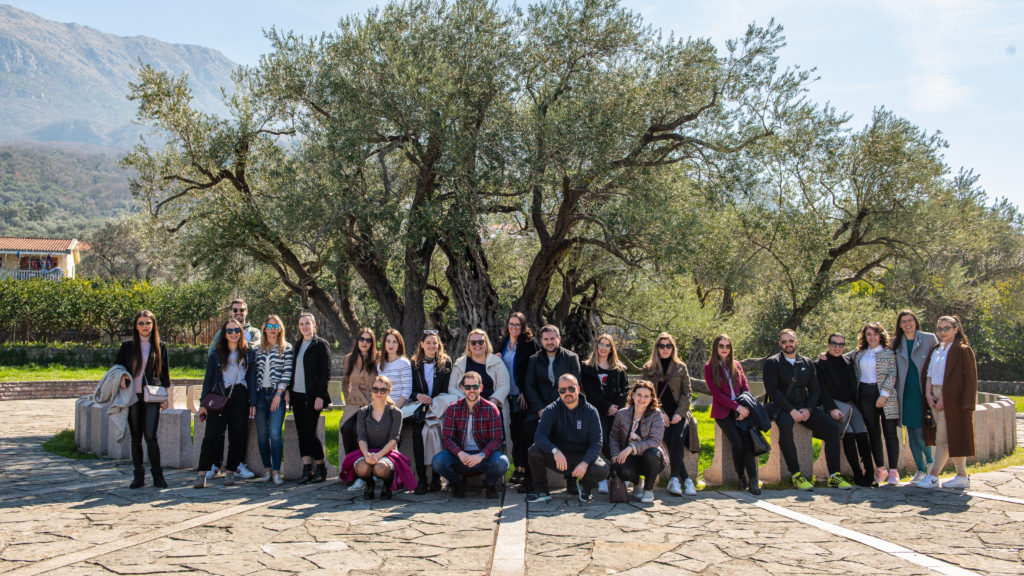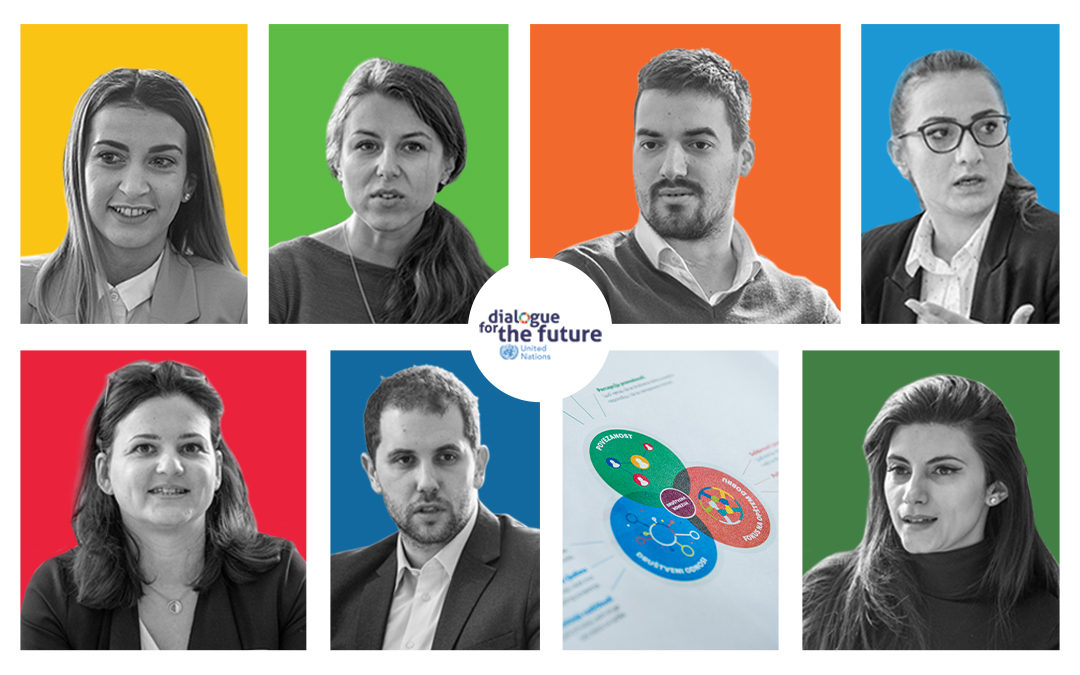Dialogue for Tolerance and Cohesion
On the occasion of UN International Day of Tolerance, November 16, a group of young civil servants from Montenegro gathered for a final workshop of the capacity building programme on social cohesion they have attended during 2020.
Over the last 9 months, this group of young enthusiastic professionals contributing to international cooperation and diplomacy across 8 government institutions has shown passion to explore social cohesion intercultural communication in local and global contexts.
The programme was organised in the frameworks of regional initiative “Dialogue for the future”, focused on trust, diversity and social cohesion.
“The goal of the program gained special importance in the new circumstances. Communication, trust and cooperation are prerequisites for society’s resilience to challenges”, said Ambassador Mirsad Bibović, coordinator of the Diplomatic Academy of the Ministry of Foreing Affars of Montenegro during the certification award ceremony.
Ambassador pointed out that on this specific day we should be reminded that “we are all individually responsible for creating a social cohesion”, and therefore we should invest in young generations, thus investing in the future of more tolerant and cohesive world.
“You, as young women and men in public service are an invaluable asset and driving force in striving for accountable, progressive, responsive, strong institutions. You are messengers of peace and development, regional and global cooperation, and your voice and contribution echoes far”, said Daniela Gasparikova, UNDP resident representative in Montenegro on this occasion.
It all started under the Olive Tree

Young diplomats started their learning journey with the workshop in Bar, in March this year, to discuss intercultural communication in the global world. Under the olive tree, older than 2000 years, the group of young people listened the story about this symbol of peace, love and friendship, and the Old Bar, the place where this olive tree is located, is a symbol of multicultural Montenegro for more than 1000 years.
This workshop put specific focus on communication skills, understanding importance of cultural identities in shaping attitudes and perceptions, both individually and in/between groups, as well globally, understanding cultural diversity and looking at contemporary challenges for social cohesion and cooperation
Intercultural communication is a pillar of international relations and diplomacy, but also a pillar of multicultural and multi-confessional Montenegro, reminded ambassador Bibović. In his opening words during the launch of the programme in March 2020, at the moment of global rise of Covid-19 pandemic, he said :
“The world is changing in front of our eyes, perhaps faster than we would like, perhaps not always in the way we would like, but all the more so, mutual understanding and respect for diversity is necessary for achieving the common good, both nationally, regionally and globally“.
Over the course of two-day workshop, the concept of social cohesion in the global world, as well the concept of interculturalisam and globalisation, was brought closer to the participants by Danijela Vuković Ćalasan, Professor at the University of Montenegro. She specificaly pointed out that social cohesion relies on trust in institutions and political decision makers, as well as trust between people, and their willingness to act collectively for common good – social development, peace and stability. Additionally, she has indicated that its only cohesive societies that are resilient to external risks and crises.
Various aspects of culture and identity, as well as group mentality were discussed with participants by long-time Montenegrin diplomat Vesko Garčević, now a Professor of International relations and practice at Boston University’s Pardee School for Global Studies. During the presentation professor Garčević raised an important question – do we feel more (in)secure in the world divided by antagonism?
Interactive sessions on factors affecting social cohesion and cooperation facilitated by Ajša Hadžibegović, put additional light on different aspect of intercultural communication referring to importance of respecting ourselves and others, openness to diversity, social justice and responsibility, tolerance, recognizing stereotypes, prejudice and discrimination, safeguarding human rights, empathy and solidarity.
It soon became clear that the world had a real life exercise unfolding in front of this group of young people, making them witnesses of global crisis, while the first lockdowns were enforced and the world seemed to have stopped. In the months to come, it has been reaffirmed that solidarity, cooperation and trust are cornerstones of social cohesion and resilience to crisis – the very vision that gathered young people on this learning and dialogue journey.
And then we moved to virtual space

Due to the pandemic-related restrictions, the discussion has been continued through a series of webinars, exploring intercultural nuances of diplomacy, international cooperation for contemporary global challenges and similar, with Vesko Garčević and Siniša Vuković, Senior Lecturer at Johns Hopkins University’s School of Advanced International Studies.
In the epicentre of global challenge, Garčević engaged participants in the discussion on multilateralism, putting special emphasis on the issues of international cooperation and the effective response of the international community in facing the challenges of the present and future. What is multilateralism today; whether multilateralism is in crisis; whether the pandemic revealed all the shortcomings of multilateralism – were some of the issues that Garčević discussed with the participants. Additionally, participants had the opportunity to exchange views on ways of future cooperation between states, and the role and place of small states such as Montenegro.
In our world of thousands cultures, global cooperation requires extensive and continuous interaction between different parties. For that reason, Vuković brought closer to the group various cultural patterns that can be found in international relations. Participants had the opportunity to better understand cultural differences when it comes to concepts such as time and exactness, the importance of nonverbal communication, how to gain trust, and approaches to solving problems. He explained that working in a multicultural environment implies different communication patterns. Gestures, concepts like problem solving, gaining trust or managing time vary from one culture to another.
Participants were reminded that it is not just about communication, but also about ability to make a distinction between information, too much information and disinformation. The participants have witnessed Covid-19 pandemic and additional one – infodemic. For that reason, over the course of third webinar professors Garčević and Vuković put special focus on the modern phenomena in both traditional and social media space, hate speech, stigmatization, fake news. It was an opportunity to look closer to the issues of dehumanization and stigmatization, post-truth, the difference between disinformation and fake news, deep fake, all of these closely related to the issues of cooperation, acceptance of diversity, human rights, but also the current situation with pandemic and society response/resilience to risks.
Hub for the future
In September, the group of young people gathered around the Dialogue for the future vision used the opportunity to join global community of international relations professionals during the international Summer School for young diplomats ‘’Gavro Vuković’’. This is one of the most successful and globally recognized projects of the Diplomatic Academy, a unique programme that promotes intercultural awareness and contributes to building trust and understanding among young diplomats from all over the world. The 13th edition of summer school was exceptional opportunity to find out more on global cooperation for overcoming global challenges, to get familiar with digital diplomacy and the new skills for emerging generation of diplomats, and more.
In order to enable further learning and strengthen cooperation of young diplomats and civil servants in the changing world, Dialogue for the future provided yet another tool – youngdiplomats.me. This portal is a dedicated online hub for discussing ideas and sharing thoughts among young diplomats in Montenegro and globally, as well as place for promoting of values, information and knowledge needed for the 21st century diplomacy and cooperation for sustainable and cohesive world.
Our ambition is to preserve and future develop once established relations among young professionals, as well to expand our network of young bright minds, thus encouraging cooperation and building trust for the more secure and prosperous world.
“In your future professional lives, you may be faced with decisions that will not be easy…It is principles underpinning the concept of social cohesion that will help to guide you through making the right choices on the path to the future we all want.” (D. Gasparikova)
***
This capacity building programme for the group of 30 young diplomats and civil servants from Montenegro was organized by Diplomatic Academy of the Ministry of Foreign Affairs of Montenegro and United Nations Development Programme (UNDP) within the regional initiative Dialogue for the future (DFF). DFF is jointly implemented by UNDP, UNICEF, UNESCO and relevant institutions in Montenegro, Republic of Serbia and Bosnia and Hercegovina, aiming to create additional space for constructive dialog between citizens, communities, citizens and decision makers, thus promoting social cohesion, trust and respect for diversity. The programme is funded by United Nations Peacebuilding Fund (PBF).

